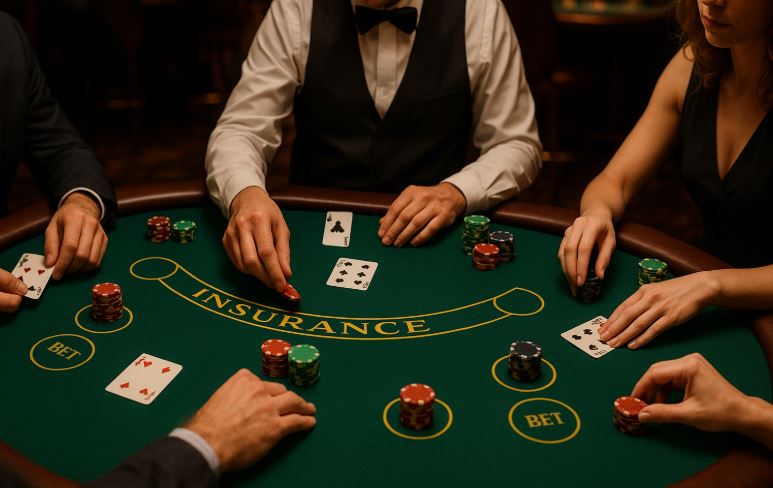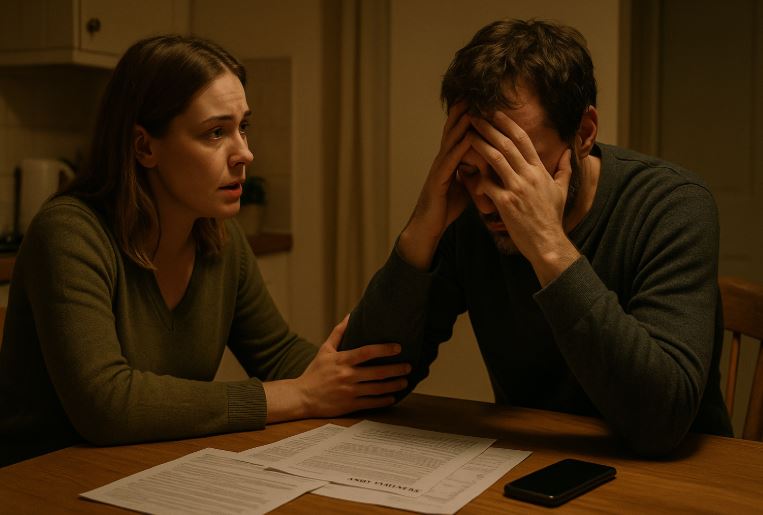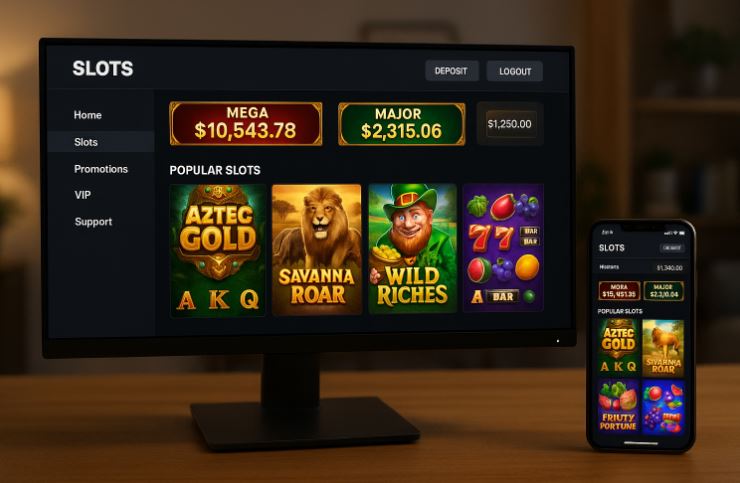What Is Insurance in Blackjack? | A Quick Explanation for Players
Blackjack is one of the most exciting and strategic casino games played across the globe. Among its various betting options, the concept of “insurance” often sparks curiosity and debate among players.
While some consider it a safeguard against losing, others see it as a trap designed to increase the house edge.
In this comprehensive guide, we will explore what insurance in blackjack is, how it works, its rules, and whether it’s truly worth taking.
By the end of this article, you will have a clear understanding of how to approach insurance in blackjack with confidence and strategy.
What Is Insurance in Blackjack?
Insurance in blackjack is a side bet offered to players when the dealer’s face-up card is an Ace. The premise behind insurance is simple: it is meant to protect your main bet in case the dealer has a blackjack. When the dealer shows an Ace, you are given the option to place an additional wager; this is your insurance.
How Insurance Works?
The insurance bet is typically half of your original wager. For example, if your initial bet is £20, the insurance bet would be £10. If the dealer’s hidden card, known as the “hole card,” is indeed a 10-value card (10, Jack, Queen, or King), the dealer has blackjack.
In this case, your insurance bet pays out at 2:1. You receive £20 from your £10 insurance wager, effectively covering the loss of your original bet.
However, if the dealer does not have blackjack, you lose the insurance bet, and the game continues as normal with your main hand. This means that although you placed the insurance bet, it was essentially lost money if the dealer did not complete blackjack.
Why Is It Offered?
Casinos offer insurance as a way to entice players into thinking they can protect themselves against losses. In reality, the insurance bet has a high house edge of around 7%, which is significantly higher than the standard edge in blackjack. This makes insurance more profitable for the casino than for the player in the long run.
Why Do Players Take Insurance in Blackjack?

The main reason players take insurance is the fear of losing their main bet if the dealer has blackjack. When the dealer’s face-up card is an Ace, the possibility of them having a 10-value card underneath seems plausible, prompting many players to hedge their bets with insurance.
Psychological Influence of Insurance
The idea of protecting your primary bet is appealing, especially for beginners who may not fully understand the odds. It feels like a form of security, a chance to recover your loss if the dealer has a natural blackjack. The 2:1 payout ratio adds to this illusion of safety, making it look like a smart choice.
In reality, the dealer only completes blackjack about 30% of the time when showing an Ace. This makes the insurance bet statistically unfavourable for the player. The remaining 70% of the time, the insurance bet is simply lost, adding to the casino’s profits.
Situations Where Players Opt for Insurance
- High Stakes Hands: Players sometimes take insurance when they have a particularly large bet on the table.
- Streak of Dealer Blackjacks: A few consecutive blackjack hands by the dealer might prompt players to insure their bets.
- Misunderstanding the Odds: Many players incorrectly believe that insurance offers fair protection, not realising its statistical disadvantage.
How Does Insurance Work in Blackjack?
Understanding how insurance works in blackjack is crucial for making informed betting decisions. The option to take insurance is only presented when the dealer’s face-up card is an Ace. At this point, the dealer will ask if you want to “take insurance.”
Placing the Bet
The insurance bet is always equal to half of your original wager. If you bet £30, the insurance bet would be £15. This side bet is entirely separate from your main wager, meaning it is handled independently during the game.
Payout Structure
If the dealer’s hidden card is a 10-value card, completing a blackjack, the insurance bet pays out at 2:1. For your £15 insurance bet, you would win £30. However, your main bet would still be lost unless you also have blackjack, resulting in a “push.”
If the dealer does not have blackjack, you lose the insurance bet, and the game continues with your original hand. The loss of the side bet is permanent, even if you win the main hand.
Statistical Odds of Winning
Statistically, the dealer will only complete blackjack about one-third of the time when showing an Ace. This makes insurance a losing proposition for the player over many rounds of play. Experienced players and blackjack strategists often recommend avoiding insurance unless card counting is involved.
Blackjack Insurance Rules – Step by Step

Understanding the rules for blackjack insurance can help clarify when and how to use it effectively. Here is a step-by-step explanation of how insurance works during a typical blackjack hand.
Step 1: Dealer Shows an Ace
When the dealer’s up-card is an Ace, they will offer insurance to the players before revealing their face-down card.
Step 2: Option to Place an Insurance Bet
You can choose to place an insurance bet, which is equal to half of your original wager. This decision must be made before any additional cards are played or the dealer reveals their hole card.
Step 3: Dealer Checks for Blackjack
The dealer will peek at their face-down card to see if it is a 10-value card, completing a blackjack. This is done discreetly to avoid revealing the card’s value.
Step 4: Resolving the Bet
- If the dealer has blackjack, the insurance bet pays out 2:1. You win back your insurance bet’s value, but your original bet is still lost unless you also have blackjack.
- If the dealer does not have blackjack, the insurance bet is lost, and the hand continues.
Step 5: Continue the Game
If insurance is lost, the game proceeds normally, with players trying to beat the dealer’s hand based on the standard rules of blackjack.
When Should You Take Insurance in Blackjack?
The decision to take insurance is one that requires careful consideration. For the average player, the insurance bet is statistically disadvantageous. The odds are not in your favour because the dealer is only likely to have blackjack about 30% of the time when showing an Ace.
Strategic Scenarios for Taking Insurance
There are, however, specific situations where taking insurance might be justified:
Card Counting
If you are counting cards and know that a significant number of 10-value cards remain in the deck, insurance may become a positive bet. In this case, the probability of the dealer having blackjack increases, making the 2:1 payout potentially profitable.
High Stakes and Splits
Players sometimes take insurance when their primary bet is significantly large or when they have split a strong hand like two Aces. In these cases, the insurance bet is seen as a form of damage control.
Avoiding Insurance in Most Cases
For the majority of players who are not counting cards, insurance is generally not recommended. It is statistically proven to be a losing bet over time, primarily benefiting the casino.
What Are the Pros and Cons of Taking Insurance in Blackjack?

When it comes to deciding whether or not to take insurance in blackjack, understanding the pros and cons can be extremely helpful.
While insurance may seem like a form of protection, it comes with its own set of advantages and disadvantages that can impact your overall strategy and bankroll.
Pros of Taking Insurance
- Minimizes Losses on Big Hands: If you are betting large amounts, insurance can provide a cushion.
- Potential for Immediate Payout: The 2:1 payout is tempting if you suspect a blackjack.
Cons of Taking Insurance
- High House Edge: With a house edge of around 7%, the casino benefits more than the player.
- False Sense of Security: While it seems protective, most of the time, the dealer does not have blackjack, leading to regular losses.
- Better Options Available: Adjusting your main hand strategy is often more effective than insuring your bet.
Is Insurance in Blackjack a Good Strategy?
For most players, insurance in blackjack is not considered a good strategy. Statistically, the dealer is less likely to have blackjack when showing an Ace than players might think. The idea of insuring your bet sounds appealing, but the numbers tell a different story.
The Mathematics Behind Insurance
When the dealer shows an Ace, there are 16 possible 10-value cards in a standard deck of 52 cards.
This results in a 4:13 chance (approximately 30%) that the dealer will actually have blackjack. Meanwhile, players are betting half of their original wager for a 2:1 payout. In the long run, the math does not add up favourably for the player.
Professional Advice on Insurance
Most professional blackjack players and strategists advise against taking insurance. The only exception is when a player is counting cards and has concrete evidence that there are more 10-value cards left in the deck than usual. In standard play, however, insurance simply adds to the house’s advantage.
Situations Where Insurance Might Be Viable
While generally unwise, there are specific circumstances where insurance can be beneficial:
- If you are card counting and are confident that the remaining deck is rich with 10-value cards.
- If you have a very large bet on the table, insurance might act as a form of hedging.
In these rare cases, the insurance bet may make mathematical sense, but for the majority of players, it remains a losing proposition.
What Is the Payout for Insurance in Blackjack?

The payout for insurance in blackjack is always set at 2:1. This means that for every £1 you bet on insurance, you receive £2 if the dealer has blackjack.
It’s important to understand that this payout structure is fixed and does not change based on table limits or variations of the game.
Example of Insurance Payout
Suppose you place a £20 main bet and decide to take insurance for £10 when the dealer’s face-up card is an Ace. If the dealer’s hole card is a 10-value card, you win £20 from the insurance bet while losing your initial £20, effectively breaking even.
If the dealer does not have blackjack, you lose the £10 insurance bet and continue playing with your main hand. In this scenario, the insurance wager becomes a sunk cost, with no influence on the outcome of your primary bet.
Comparison to Other Payouts
- Blackjack Win: 3:2 payout
- Regular Win: 1:1 payout
- Insurance Win: 2:1 payout
While the 2:1 payout for insurance seems appealing, it is offset by the high probability that the dealer does not have blackjack. This makes it a high-risk, low-reward option in standard play.
Should Beginners Take Insurance in Blackjack?
For beginners, insurance is generally not recommended. While it may seem like a form of protection, the reality is that insurance bets statistically favour the casino.
New players are often lured into taking insurance because they do not fully understand its odds and implications.
Why Beginners Should Avoid Insurance?
- The house edge on insurance is much higher than on the main blackjack bet.
- It is based on the assumption that the dealer has blackjack, which statistically happens only about 30% of the time when showing an Ace.
- It is an independent bet that is entirely separate from the outcome of your main hand.
Better Strategies for Beginners
Instead of focusing on insurance, beginners are better off learning basic blackjack strategies such as:
- Knowing when to hit or stand based on the dealer’s up-card.
- Understanding the value of splitting pairs and doubling down.
- Avoiding side bets that offer poor returns, like insurance.
By mastering the basics, new players can significantly reduce the house edge and improve their chances of winning.
Can Insurance in Blackjack Be Avoided?

Yes, insurance in blackjack can absolutely be avoided, and most seasoned players do just that. Many experienced blackjack players view insurance as a “sucker bet,” designed to capitalise on a player’s fear of losing their main hand.
Why Most Players Avoid Insurance?
Insurance is generally considered an unwise bet because it provides very little real protection. Statistically, the chances of the dealer actually having blackjack are lower than what the 2:1 payout might suggest. Over many hands, the cumulative losses from insurance bets can outweigh the occasional win.
Alternative Strategies Instead of Insurance
- Focus on Main Hand Strategy: Concentrating on perfecting your main hand decisions is far more impactful than side bets.
- Avoid Side Bets: Beyond insurance, many blackjack side bets are designed to increase the house edge.
- Card Counting (If Skilled): If you are experienced in card counting, only then might insurance be worth considering.
Professional Player Insights
The majority of professional blackjack players avoid insurance entirely unless they are counting cards. For regular play, the high house edge makes it an unfavourable choice.
Many players find that simply focusing on strong play decisions for their main hand results in better returns over time.
Conclusion
Insurance in blackjack is often misunderstood as a protective measure, but in reality, it is a separate bet that statistically favours the casino. While it may occasionally save you from a dealer’s blackjack, the odds are rarely in your favour.
Most experienced players recommend avoiding insurance unless you are confident in card counting and know the deck composition. For beginners and average players, focusing on a strong main hand strategy is far more beneficial than placing side bets like insurance.
Understanding the mechanics and mathematics of insurance can significantly improve your blackjack experience and help you avoid unnecessary losses.
FAQs
Is insurance always a bad bet in blackjack?
No, but it is generally unfavourable unless you are counting cards.
Can card counting make insurance profitable?
Yes, in specific situations where the deck is rich in 10-value cards.
Should beginners ever take insurance?
It is generally not recommended for beginners due to its high house edge.
Is insurance available in all blackjack games?
Most standard blackjack games offer it, but some variants do not.
What is the main purpose of insurance in blackjack?
It is designed to protect your main bet if the dealer has blackjack.
Disclaimer:
UK Casino Blog does not operate or promote any form of gambling. All content is for news, analysis, and educational purposes only. Please gamble responsibly and seek help if you are affected by gambling-related issues.







